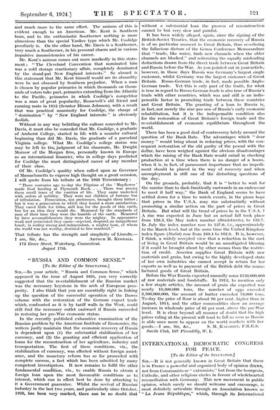"RUSSIA AND COMMON SENSE."
[To the Editor of the SPECTATOR.] SIR,—In your article, " Russia and Common Sense," which appeared in the issue of August 16th, you very correctly suggested that the re-establishment of the Russian market was the necessary keystone in the arch of European pros- perity. I also think that you are essentially right in linking ! up the question of the successful operation of the Dawes scheme with the restoration of the German export trade which, confronted as it is by tariff walls in the West, could still find the necessary outlet eastward if Russia succeeded In restoring her pre-War economic status.
In the recently published exhaustive examination of the Russian problem by the American Institute of Economics, the writers justly maintain that the economic recovery of Russia is dependent upon (1) the substantial stabilization of her currency, and (2) the granting and efficient application of loans for the reconstruction of her agriculture, industry and transportation. The first of these conditions, viz., the stabilization of currency, was effected without foreign assist- ance, and the monetary reform has so far proceeded with complete success, a fact which has been admitted by many competent investigators. It now remains to fulfil the other fundamental condition, viz., to enable Russia to obtain a foreign loan upon the most favourable conditions as to interest, which can in effect best be done by attaching to it a Government guarantee. Whilst the revival of Russian industry in the last two years, and particularly since October, 1928, has been very marked, there can be no doubt that
without a substantial loan the process of reconstruction cannot be but very slow and painful.
It has been widely alleged, again, since the signing of the British-Soviet Treaties, that the economic recovery of Russia is of no particular moment to Great Britain, thus re-echoing the fallacious dictum of the Genoa Conference Memorandum that " trade, like water, finds new channels when the older channels are blocked," and reiterating the equally misleading deductions drawn from the direct trade between Great Britain and Russia before the War. As you pointed out in your article, however, in those days Russia was Germany's largest single customer, whilst Germany was the largest customer of Great Britain. Russo-German trade, in fact, made possible Anglo- German trade. Yet this is only part of the truth, for what is true in regard to Russo-German trade is also true of Russia's trade with other countries, which was and still is an indis- pensable factor in promciting trade between these countries
and Great Britain. The granting of a loan to Russia is, in fact, not merely the sine qua non of Russia's early economic
rehabilitation, but it is the indispensable condition also for the restoration of Great Britain's foreign trade and the re-establishment of economic equilibrium throughout the world.
There has been a good deal of controversy lately around the question of the Bank Rate. The advantages which " dear money " would bring about in reducing prices, with the con- sequent restoration of the old parity of the poand with the dollar, have been weighed against the obvious disadvantages which the raising of the Bank Rate would entail in checking production at a time when there is no danger of a boom, when it is, in fact, of paramount importance that no impedi- ment should be placed in the way of recovery and when unemployment is still one of the disturbing questions of the day.
On the grounds, probably, that it is " better to wait for the sunrise than to dash frantically eastwards in an endeavour to meet it half way," the Bank of England seems to have settled down for a time to watch events, in the pious hope that prices in the U.S.A. may rise substantially without promoting a similar action on the part of prices in Great Britain. But what will the trend of prices be in the U.S.A. ? A rise was expected in June but an actual fall took place from 133.5, the May index number (Bradstreets), to 132.7.
In July the index number rose to 137.0, i.e., approximately to the March level, but at the same time the United Kingdom Index figure (Statist) rose from 160.4 to 162.8. It is, however, I think, a widely accepted view that a reduction in the cost of living in Great Britain would be an unmitigated blessing
if it could be brought about by other means than the restric- tion of credit. America supplies Great Britain with raw materials and grain, but owing to the highly developed state of her own industries she cannot accept in return for her exports as well as in payment of the British debt the manu- factured goods of Great Britain.
Before the War Russia exported annually some £150,000,000 of raw materials and foodstuffs. In 1913, to mention only a few staple articles, the amount of grain she exported was nearly 10,500,000 tons, the number of eggs exceeded 3,500,000,000, the amount of butter exceeded 76,000 tons.
To-day the price of flour is about 90 per cent. higher than in August, 1914, and the other commodities show an average increase in wholesale price of 65 per cent. above the pre-War level. It is clear beyond all manner of doubt that the high prices ruling at the present will tend to fall as soon as Russia is able once more to appear on the world markets with her






































 Previous page
Previous page